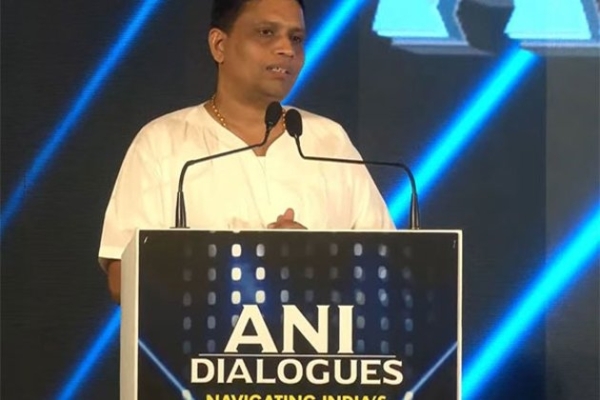"Doctors of Chinese medicine can practice in US...Ayurveda not established overseas in true form": Acharya Balakrishna

New Delhi [India], March 2 (ANI): Laying thrust on popularising Ayudveda abroad in the manner that Yoga has gained popularity, Acharya Balakrishna, co-founder of Patanjali Yogpeeth Haridwar, on Thursday said the traditional Indian system of medicine has not been able to establish itself overseas in its true form. Speaking at the inaugural edition of ANI Dialogues here in the national capital, Acharya Balakrishna said the Ayurveda has got stuck between herbal medicine and food supplements in many foreign countries and many people are not even aware of the basics of the traditional medicine practised in India for a long time. On Yoga, he said the world knows that it is a mix of some physical exercises, breathing exercises, and meditation. The United Nations declared June 21 as International Day of Yoga in 2014, and ever since its acceptance world over is increasing. On the policy side, he said some reforms may be needed in medical education, and suggested an integrated system where medical students are exposed to all branches of medical sciences. Citing an example, he said just as a law student studies all kinds of subjects in their initial years and it is during the later part of the course programme that they opt for a specialization. "Our Ayurveda has not able to establish itself overseas in it true form. Either it is there as herbal medicine or food supplements. Many people outside the country do not know whether Ayurveda is a medical science or a language. Many people think that medicines prescribed in Sanskrit text are called Ayurveda. Somewhere there is a lack of knowledge," Acharya Balakrishna said. He said that as a step to address the issue, Patanjali Ayurved has brought out a book ‘Science of Ayurveda’ which has been published in several languages around the world, including in Pakistan. "We are not translating it; rather, they are publishing it in their own language. This is a big victory for Ayurveda," he said. Acharya Balakrishna, who is Managaing Director of Patanjali Ayurved, laid stress on teaching the history of world herbs to children. "When a student goes to China to study medicine, it is compulsory for him to study Chinese medicine for three years. Of course, they will not come to India and practice Chinese medicine, but they will come back as an MBBS doctor. Can’t we replicate such practice in our country. Definitely we can," he said. Acharya Balakrishna asserted Indian doctors, who are specialists in Ayurveda and are based in the US, are unable to practice in that country and after acquiring a certificate can practice only as therapist. "Doctors specialized in Chinese medicine system can practice in the US because their degrees are recognized. But when our Ayurveda BAMS or MD goes there, I feel pain as they are not able to practice unless they take an additional certificate and then can only work as therapists," he said. "It is a harm to Ayurveda system...door to take Ayurveda global gets closed."Acharya Balakrishna spoke of the research being done by Patanjali Ayurved and said they have created a checklist of plants being used for medicine worldwide. He said a huge plant diversity exists in the world. "For the first time, Patanjali has created a checklist that how many plants are being used medicinally worldwide or that can be used in future. WHO started the same in 1999 but they closed this programme in 2010... If you talk about botany-based treatment systems all over the world, there are nine and 964 healing practices. We have worked at that level, that how many types of plants are used in this and which plant is used in a specific disease. With almost 6 lakh references, 2,000 languages of the world, approx 2,000 tribes of the world, approx 2,50,000 synonyms, approx 20,00,000 vernacular names and approx 1,25,000 pages, the World Herbal Encyclopedia has been completed," he said. He also noted that prevention of disease is always better than cure. (ANI)

